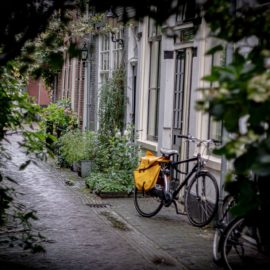
Will we see these in our backyard? I have seen an egret on Napoleon.
Parks that absorb stormwater? Wetlands brought back to life on the edge of New Orleans? Those are the kinds of ideas that could qualify for major grant money as part of a competition to improve New Orleans area infrastructure at a time of intensifying storms. The Greater New Orleans Foundation is organizing the competition, aiming to promote viable solutions with a reasonable chance of qualifying for further grant dollars from the federal government or elsewhere. It’s called the Next 100 Years Challenge – a reference to the foundation celebrating its centennial this year, but also a description of what it hopes to achieve through the competition: lasting infrastructure solutions that will serve the region and its people in the decades to come. It will award up to 10 grants of $100,000 to help advance the proposals while also providing technical assistance to seek federal money. Teams are being encouraged to demonstrate buy-in from the communities where the projects would occur and benefits to disadvantaged areas. All details can be found on the competition website. A technical assistance webinar is scheduled for Monday at 10:30 am. “One of the questions that our board has been asking is, ‘what can we do in the next 5-10 years that will help transform our region for the next 100?’” said foundation president Andy Kopplin. “And so the Next 100 Years Challenge is one of those ideas. Here’s something we can do to come up with good ideas and attract the resources to implement them. They could have significant benefits for a couple generations here in our greater New Orleans region.”
nola.com
These are examples of what can be done but range of type of problem is wide.
The foundation is pointing to three area projects as examples, though the range of possibilities is wide: The reimagining of Gretna City Park, which aims to better manage stormwater and make the space more accessible, with amenities such as a pavilion and kayaking, The Sankofa Wetland Park and Nature Trail in the Lower 9th Ward of New Orleans, which aims to reduce flood risk while providing recreational opportunities to an area of the city that saw extreme flooding in the 2005 levee failures during Hurricane Katrina and the Pontilly Neighborhood Stormwater Project, which seeks to reduce flood risks and improve green space in New Orleans’ Pontchartrain Park and Gentilly Woods neighborhoods. Gretna Mayor Belinda Constant said her city’s park project was financed through federal grant money and has proven successful, with a ribbon-cutting planned for April 28. “This is basically an extreme advancement of resilience relative to how we live with water today, as well as a quality of life project,” Constant said. “It is truly a little gem here on the West Bank.”
Applicants must be non-profits but they can partner with others.
Applicants must be nonprofits or government agencies, though they can partner with private sector firms – architectural or engineering, for example – to help see through projects. Projects must involve communities in the foundation’s 13-parish area of southeast Louisiana. Participants must register by June 20 and submit online applications by July 18. Key behind the thinking is that the projects could serve to leverage federal grant dollars that could help see them through. The foundation cites the federal program known as BRIC, or Building Resilient Infrastructure and Communities. While $2 billion was available through the BRIC program last year, Louisiana received none of it, said Kopplin. New Orleans and Kopplin currently have a direct link to infrastructure funding in Washington. Former mayor Mitch Landrieu serves as White House infrastructure coordinator and Kopplin was Landrieu’s chief administrative officer at city hall. “If this competition helps you come up with that idea and gives you the support and resources that you need to prepare that competitive application, then we’ll have helped cross that barrier that currently exists between somebody having a great idea and not doing anything with it,” he said. Kopplin said ideally Louisiana would go from no BRIC money to “maybe 10 of them that win.”
Any free thinkers and engineers in our midst whit an idea to consider?



